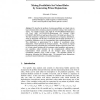Free Online Productivity Tools
i2Speak
i2Symbol
i2OCR
iTex2Img
iWeb2Print
iWeb2Shot
i2Type
iPdf2Split
iPdf2Merge
i2Bopomofo
i2Arabic
i2Style
i2Image
i2PDF
iLatex2Rtf
Sci2ools
122
click to vote
PKDD
1999
Springer
1999
Springer
Mining Possibilistic Set-Valued Rules by Generating Prime Disjunctions
We describe the problem of mining possibilistic set-valued rules in large relational tables containing categorical attributes taking a finite number of values. An example of such a rule might be “IF HOUSEHOLDSIZE={Two OR Tree} AND OCCUPATION={Professional OR Clerical} THEN PAYMENT_METHOD={CashCheck (Max=249) OR DebitCard (Max=175)}. The table semantics is supposed to be represented by a frequency distribution, which is interpreted with the help of minimum and maximum operations as a possibility distribution over the corresponding finite multidimensional space. This distribution is approximated by a number of possibilistic prime disjunctions, which represent the strongest patterns. We present an original formal framework generalising the conventional boolean approach on the case of (i) finite-valued variables and (ii) continuos-valued semantics, and propose a new algorithm, called Optimist, for the computationally difficult dual transformation which generates all the strongest prime d...
Data Mining | PKDD 1999 | Possibilistic Prime Disjunctions | Possibilistic Set-valued Rules | Prime Disjunctions |
| Added | 04 Aug 2010 |
| Updated | 04 Aug 2010 |
| Type | Conference |
| Year | 1999 |
| Where | PKDD |
| Authors | Alexandr A. Savinov |
Comments (0)

